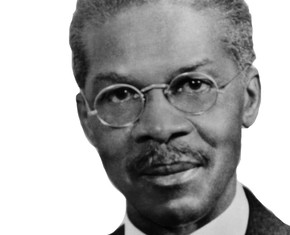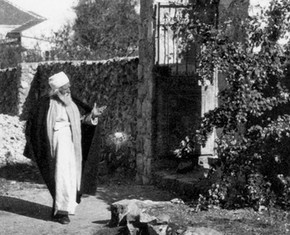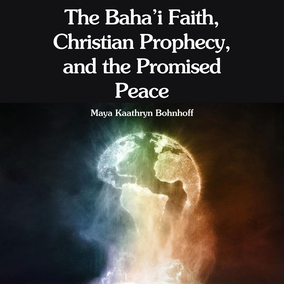The views expressed in our content reflect individual perspectives and do not represent the authoritative views of the Baha'i Faith.
If you ever go to France, make sure you see the Douaumont ossuary, the famous memorial to soldiers who died in World War I. I promise you’ll never forget it.
L’ossuaire de Douaumont, a huge building northeast of Paris with an imposing 46-meter-high central tower, contains the skeletal remains of 130,000 French and German soldiers who died on the Verdun battlefield. When you’re there, look into the small outside windows. You’ll see pile after pile of those bones filling up the alcoves around each window.
Yes, it’s a gruesome, horrible sight—but no other war memorial quite matches its stark, sobering power. Rows of graves line the cemetery outside the Douaumont Ossuary, but thousands of grave markers have nowhere near the impact those bones do. Ironically comingled in death, you can’t tell the difference between the bones of the German soldiers and the bones of the French soldiers:
We live upon this earth for a few days and then rest beneath it forever. So it is our graveyard eternally. Shall man fight for the tomb which devours him, for his eternal sepulcher? What ignorance could be greater than this? To fight over his grave, to kill another for his grave! What heedlessness! What a delusion! – Abdu’l-Baha, The Promulgation of Universal Peace, p. 355.
In the aftermath of that pointless bloodbath they called “The Great War” or the “War to End All Wars,” the world began to agree with Baha’u’llah’s assertion that world unity formed the main prerequisite for world peace. That postwar period witnessed the first serious attempts to establish some nascent form of world unity, starting with the League of Nations, initiated by horrified nations that wanted to find a path toward the permanent cessation of such wanton slaughter.
When the world leaders who composed the Central Organisation for a Durable Peace in The Hague asked him for his advice after World War I, Abdu’l-Baha addressed that body about the Baha’i Peace Plan. His letter, dated 17 December 1919, outlines the constructive, unifying approach Baha’is encourage world leaders to take to form a universal and lasting peace:
O ye esteemed ones who are pioneers among the well-wishers of the world of humanity!
… Your intention deserves a thousand praises, because you are serving the world of humanity, and this is conducive to the happiness and welfare of all. This recent war has proved to the world and the people that war is destruction while Universal Peace is construction; war is death while peace is life; war is rapacity and bloodthirstiness while peace is beneficence and humaneness; war is an appurtenance of the world of nature while peace is of the foundation of the religion of God; war is darkness upon darkness while peace is heavenly light; war is the destroyer of the edifice of mankind while peace is the everlasting life of the world of humanity; war is like a devouring wolf while peace is like the angels of heaven; war is the struggle for existence while peace is mutual aid and co-operation among the peoples of the world and the cause of the good-pleasure of the True One is the heavenly realm.
There is not one soul whose conscience does not testify that in this day there is no more important matter in the world than that of Universal Peace. Every just one bears witness to this and adores that esteemed Assembly because its aim is that this darkness may be changed into light, this bloodthirstiness into kindness, this torment into bliss, this hardship into ease and this enmity and hatred into fellowship and love. Therefore, the effort of those esteemed souls is worthy of praise and commendation.
But the wise souls who are aware of the essential relationships emanating from the realities of things consider that one single matter cannot, by itself, influence the human reality as it ought and should, for until the minds of men become united, no important matter can be accomplished. At present Universal Peace is a matter of great importance, but unity of conscience is essential, so that the foundation of this matter may become secure, its establishment firm and its edifice strong.
Therefore His Holiness Baha’u’llah, fifty years ago, expounded this question of Universal Peace at a time when he was confined in the fortress of Akka and was wronged and imprisoned. He wrote about this important matter of Universal Peace to all the great sovereigns of the world, and established it among his friends in the Orient. The horizon of the East was in utter darkness, nations displayed the utmost hatred and enmity towards each other, religions thirsted for each other’s blood, and it was darkness upon darkness. At such a time His Holiness Baha’u’llah shone forth like the sun from the horizon of the East and illumined Persia with the lights of these teachings.
Among his teachings was the declaration of Universal Peace. People of different nations, religions and sects who followed him came together to such an extent that remarkable gatherings were instituted consisting of the various nations and religions of the East. Every soul who entered these gatherings saw but one nation, one teaching, one pathway, one order, for the teachings of His Holiness Baha’u’llah were not limited to the establishment of Universal Peace. They embraced many teachings which supplemented and supported that of Universal Peace. – Abdu’l-Baha, Tablet to the Hague, pp. 3-4.
The huge, historic task of universal peace, Abdu’l-Baha seemed to say in this message, could not be achieved by any single body of well-intentioned men. First, he said, “unity of conscience is essential.” There must be some force, some deeply spiritual system of belief, that could penetrate and unite the minds of humanity. That force, he said, had already come, in the teachings of Baha’u’llah.
You May Also Like
Comments

















We need leaders who are truely committed to peace, yet in most countries people are able to elect leaders. So , is it the individuals who first need to truly want peace , who will then chose to elect leaders , with this same vision. I think most leaders do what is popular, so they can get reelected.